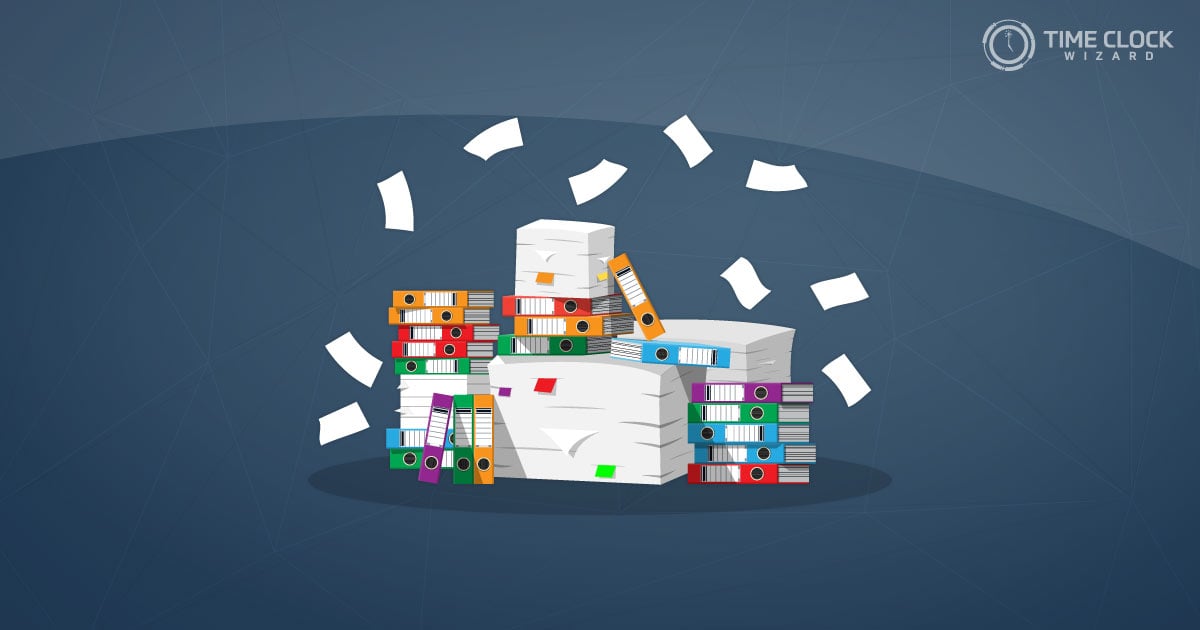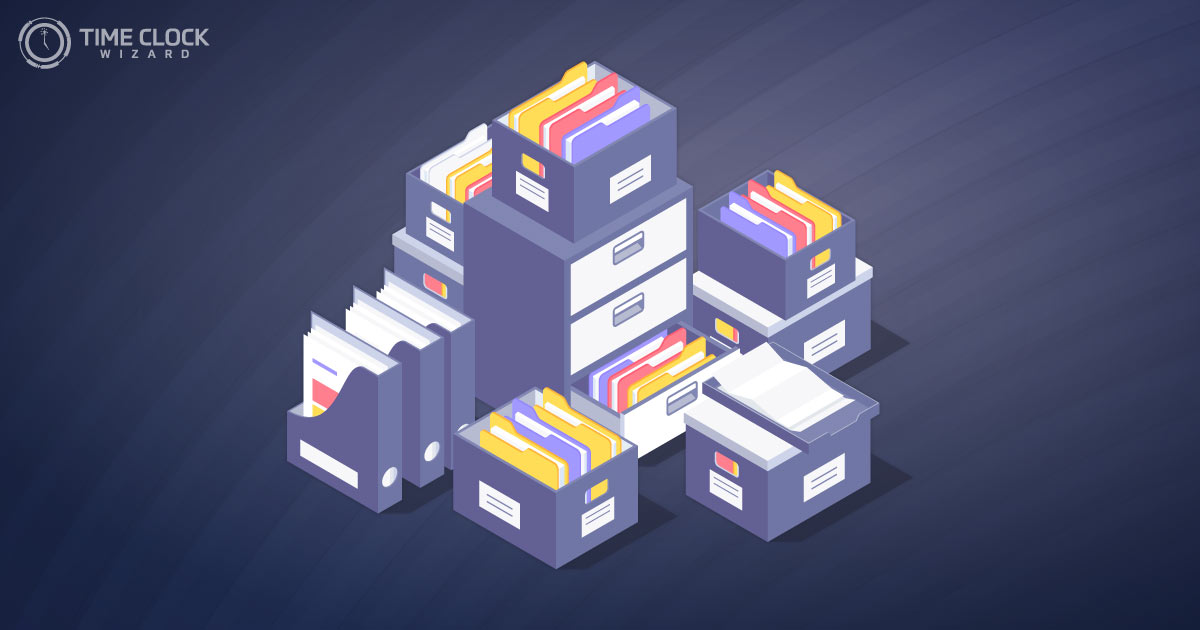
An effective record keeping system is essential to running a successful business. In fact, it’s almost impossible for a business to function without one. When it’s done right, record keeping can be one of the most valuable management tools your company has. Record keeping is especially important for managing employee information. As such it’s a task that plays a central role in the work of HR departments.
That’s why all HR personnel need to understand what goes into a record keeping system. First, they need to understand the most general characteristics of good record keeping. After that, they need to apply this general knowledge to their company’s specific documentation needs. Once this happens, they’ll have the knowledge and practice that’s required to stay compliant with local, state, and federal laws.
We’ll be taking an analogous tack in the following sections. First, we’ll discuss the elements of effective record keeping. Then, we’ll go over the rules that govern the management of employee information. Lastly, we’ll present some additional reasons that good record keeping is so important.
The Fundamentals of a Good Record System
A record keeping system refers to the methods a business uses to gather, manage, and grant access to essential company information. The way these systems function varies from company to company, but the most effective usually have the following five things in common:
- They’re designed and maintained by a select group of HR personnel.
- This same group updates the system as need be and does regular audits.
- The system is designed around a sound record-keeping strategy.
- The record keeping strategy is simple to follow and easily duplicated by new personnel.
- The strategy includes protocols for security, access, and retention.
These guidelines are important to the design of a good system. But you’ll have to go further to keep it effective over the long term.
Eight Ways to Take Your Record Keeping to the Next Level
The above guidelines represent the first few steps of your record keeping solutions. Now we’re ready to take things even further. Here are eight more qualities your record keeping system must have to maximize the value of the data it’s designed to preserve:
- A good record keeping system should be able to capture all the information that’s relevant to a company’s business activity.
- It should also have the ability to organize this information in ways that align with the company’s business procedures.
- The records it manages cannot be changed, transferred, or damaged without authorization.
- Relevant company personnel must be able to use the system as their main source of company information.
- The system must allow for easy auditing by leaving a clear trail of everyone who’s viewed or altered a given record.
- It must also give authorized personnel easy access to all pertinent records.
- An effective record keeping system must function under a pre-established set of policies.
- These policies must cover the various responsibilities for the system’s maintenance, as well as the formal techniques for properly managing it.
Follow these ‘next-level’ guidelines to create the ideal record keeping system for your company. Next, we’ll have at a look at the complexities of record retention requirements.
Record Retention Requirements for Businesses
Employee record laws exist at the local, state, and federal levels. These laws are in place to protect employers and employees from improper practices in the workplace. Failure to follow these regulations can result in a number of negative outcomes. Employers expose themselves to penalties, fines, and wrongful termination lawsuits if they fail to meet these regulations.
As HR personnel, you’re responsible for ensuring company compliance with these laws. In fact, compliance should be a focal point of both your record keeping system and its underlying strategy. If not, take action right away to weave compliance protocols into your system. In order to help you do that, we’ll answer X key questions on the subject of record retention requirements.
What kind of employee records do you have to keep?
This depends on the status of a given employee. The Fair Labor Standards Act (FLSA) divides employees into two categories– nonexempt and exempt. Several different things factor into an employee’s nonexempt or exempt status, but here are the rules that govern both groups.
Nonexempt employee records
Record retention requirements mandate that employers keep records of the following employee information:
- The full name of the employee, as well as their social security number
- The employee’s gender and occupation
- For employees under 19 years of age, employers must record their birth date
- How the employee is paid (weekly, bi-weekly, etc)
- Workweek information: the day and time when it begins
- The total number of hours an employee works each day
- The exact number of hours worked each week
- Employee’s rate of pay
- The total weekly or daily non-overtime pay the employee receives
- The amount of overtime pay an employee earns during the workweek
- Employers must record any additional pay an employee receives, as well as any deductions
- The total amount of wages earned during every pay period
- Payment date and the exact pay period it covers
Exempt employee records
For exempt employees, you only have to keep these records:
- Employee’s full name
- Employee address
- Occupation and gender
- Day and time when the workweek begins
- The total wages earned for every pay period
- Payment date and the covered pay period
How long do you have to keep employee records?
Here’s where things get a little more complicated. The length of time you’re required to keep a given record depends on the type of information it contains. Here are the rules that govern ten different types of employee information:
- Federal law requires employees to keep all hiring records for one year. This includes employee applications, resumes, and any other documents related to the hiring process.
- Employers must keep I-9 Forms for three years after hiring an employee or for one year after their termination– whichever date falls later.
- The minimum requirement for payroll information is three years. But many companies keep payroll information for as long as five years.
- Separation records must be kept for at least five years after an employee is terminated. This is to help you deal with any wrongful termination concerns that arise.
- Employers should keep retirement benefits records for six years after an employee leaves.
- Family Medical Leave Act Records: When an employee requests any amount of FMLA leave time, the employer must keep the relevant paperwork for three years after termination.
- OSHA rules dictate that employers must retain employee injury records for five years after termination.
- Tax Records: The Internal Revenue Service suggests that employers keep employee tax records on file for four years. This includes W-2 and W-4 forms, as well as total wages.
- Drug Testing Records: Typically, drug testing records are included as part of the hiring process and should be retained for at least one year. Extend this to five years for any job that’s related to the transportation industry.
- Independent Contractors: Depending on what state you do business in, third party contracts should be kept for between 3-5 years.
Even a quick look at these compliance laws will show why your record keeping system is so important. Only an accurate, efficient, and accessible system could handle so many variables. Additionally, the risks of poor record keeping are just too high to settle for anything less. In the next section, we’ll look at other reasons that quality record should always be an HR priority.
The Importance of Record Keeping
Obviously, the compliance issues alone are enough to show why good record keeping matters. But there are several other reasons it’s important as well. We’ll finish up by discussing a few of the most significant ones.
The added significance of record keeping stems largely from the power of information. For most companies, information is one of their most critical assets. Each day you’re in business, you accumulate an incredible about of data. This data comes every area of your business, but it’s only through accurate records that you can leverage it to your advantage.
First, accurate historical data helps you make sound business decisions. It helps you compare current projects to work you’ve done in the past, for instance. With the right information in hand, cost-benefit analyses are that much more accurate. As a result, you’ll have a better idea of how profitable a given project will be.
With the right record keeping system, you can store accurate procedural information as well. This allows you to reflect on ways to lower costs and allocate resources more efficiently. The information in these records can also provide a boost to creativity and innovation.
Lastly, the power of information builds on itself over time. It can help you configure and alter a variety of important business systems. These improved business systems will generate a bounty of additional information. Once this begins to happen, your company efficiency will improve in leaps and bounds.
Great Record Keeping and a Better Future
Far too many companies fail to understand the value of keeping accurate records. You’ll automatically get a let up on these companies with good record keeping. As we’ve already seen, the benefits of historical company data increase over time. The same holds true of the damage poor record keeping can do.
You can probably see where this is going. Accurate record keeping can put a huge distance between and your competitors. Assess your record keeping system as soon as you can to start outpacing the competition.







